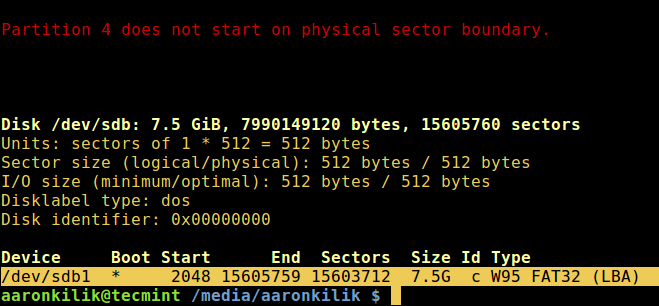mirror of
https://github.com/LCTT/TranslateProject.git
synced 2024-12-29 21:41:00 +08:00
104 lines
4.8 KiB
Markdown
104 lines
4.8 KiB
Markdown
在 Linux 系统里识别 USB 设备名字的 4 种方法
|
||
============================================================
|
||
|
||
对于初学者来说,在 Linux 系统里你必须掌握的技术之一就是识别出插入系统里的各种设备。这也许是你的系统硬盘、外部的存储设备或者是可移动设备,比如 USB 设备或 SD 闪存卡等。
|
||
|
||
现如今,使用 USB 设备来传输文件是十分常见的事,对于那些喜欢使用命令行的新手来说,当你需要格式化 USB 设备时,学会使用不同的方法来识别 USB 设备名是非常重要的。
|
||
|
||
如果在系统中插入一个设备,尤其是在桌面环境下,比如 USB 设备,它会自动挂载到一个指定目录,一般是在 `/media/username/device-label` 目录下,之后你就可以进入到该目录下访问那些文件了。然而,在服务器上就不是这么回事了,你必须[手动挂载](http://www.tecmint.com/mount-filesystem-in-linux/)这个设备,并且指定一个挂载点。
|
||
|
||
Linux 系统使用 `/dev` 目录下特定的设备文件来标识插入的设备。你会发现该目录下的某些文件,包括 `/dev/sda` 或者 `/dev/hda` 表示你的第一个主设备,每个分区使用一个数字来表示,比如 `/dev/sda1` 或 `/dev/hda1` 表示主设备的第一个分区等等。
|
||
|
||
```
|
||
$ ls /dev/sda*
|
||
```
|
||
|
||
[ 
|
||
][3]
|
||
|
||
*列出 Linux 系统下所有的设备名*
|
||
|
||
现在让我们来使用下面一些特殊的命令行工具找出设备名:
|
||
|
||
### 使用 df 命令来找出插入的 USB 设备名
|
||
|
||
查看插入你系统里的每一个设备及对应的挂载点,你可以使用下图中的 `df` 命令检查 Linux 系统磁盘空间使用情况:
|
||
|
||
```
|
||
$ df -h
|
||
```
|
||
|
||
[
|
||
][5]
|
||
|
||
*使用 df 命令查找 USB 设备名*
|
||
|
||
### 使用 lsblk 命令查找 USB 设备名
|
||
|
||
你也可以使用下面的 `lsblk` 命令(列出块设备)来列出插入你系统里的所有块设备:
|
||
|
||
```
|
||
$ lsblk
|
||
```
|
||
|
||
[
|
||

|
||
][7]
|
||
|
||
*列出 Linux 系统里的块设备*
|
||
|
||
### 使用 fdisk 工具识别 USB 设备名
|
||
|
||
[fdisk 是一个功能强大的工具][12],用于查看你系统中的所有分区表,包括所有的 USB 设备,使用 root 权限执行如下命令:
|
||
|
||
```
|
||
$ sudo fdisk -l
|
||
```
|
||
[
|
||

|
||
][9]
|
||
|
||
*列出块设备的分区表*
|
||
|
||
### 使用 dmesg 命令来识别出 USB 设备名
|
||
|
||
`dmesg` 是一个用于打印或者控制内核环形缓冲区(kernel ring buffer)的重要命令。环形缓冲区是一种数据结构,它[存放着内核操作数据的信息][13]。
|
||
|
||
运行如下命令来查看内核操作信息,它同时也会打印出 USB 设备的信息:
|
||
|
||
```
|
||
$ dmesg
|
||
```
|
||
[
|
||

|
||
][11]
|
||
|
||
*dmesg – 打印 USB 设备名*
|
||
|
||
以上就是这篇文章中提及到的所有命令,我们在命令行下使用不同的方法来找出 USB 设备名。你也可以跟大家分享下实现这个目的的其它方法,或者如果你对这篇文章有什么想法也可以在下面跟大家交流下。
|
||
|
||
--------------------------------------------------------------------------------
|
||
|
||
via: http://www.tecmint.com/find-usb-device-name-in-linux
|
||
|
||
作者:[Aaron Kili][a]
|
||
译者:[rusking](https://github.com/rusking)
|
||
校对:[jasminepeng](https://github.com/jasminepeng)
|
||
|
||
本文由 [LCTT](https://github.com/LCTT/TranslateProject) 原创编译,[Linux中国](https://linux.cn/) 荣誉推出
|
||
|
||
[a]:http://www.tecmint.com/author/aaronkili/
|
||
[1]:http://www.tecmint.com/tag/linux-tricks/
|
||
[2]:http://www.tecmint.com/mount-filesystem-in-linux/
|
||
[3]:http://www.tecmint.com/wp-content/uploads/2016/10/List-All-Linux-Device-Names.png
|
||
[4]:http://www.tecmint.com/how-to-check-disk-space-in-linux/
|
||
[5]:http://www.tecmint.com/wp-content/uploads/2016/10/Find-USB-Device-Name.png
|
||
[6]:http://www.tecmint.com/commands-to-collect-system-and-hardware-information-in-linux/
|
||
[7]:http://www.tecmint.com/wp-content/uploads/2016/10/List-Linux-Block-Devices.png
|
||
[8]:http://www.tecmint.com/fdisk-commands-to-manage-linux-disk-partitions/
|
||
[9]:http://www.tecmint.com/wp-content/uploads/2016/10/List-Partition-Table.png
|
||
[10]:http://www.tecmint.com/dmesg-commands/
|
||
[11]:http://www.tecmint.com/wp-content/uploads/2016/10/dmesg-shows-kernel-information.png
|
||
[12]:http://www.tecmint.com/fdisk-commands-to-manage-linux-disk-partitions/
|
||
[13]:http://www.tecmint.com/dmesg-commands/
|